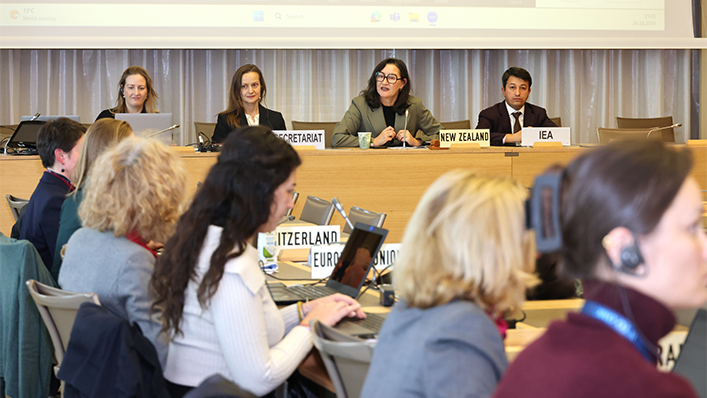
Ambassador Clare Kelly of New Zealand, coordinator of the FFSR initiative, detailed recent work undertaken under the three pillars of the FFSR initiative in line with the 13th Ministerial Conference Ministerial Statement and associated work programme.
Under the first pillar (use of existing WTO mechanisms to enhance transparency), she reported that FFSR-related questions have been posed by members in 14 WTO Trade Policy Review (TPR) meetings since March 2024 to encourage further information sharing on fossil fuel subsidies and their reform. The questions were based on the non-exhaustive list of sample questions for use in WTO Trade Policy Reviews published in Annex II of the MC13 Joint Ministerial Statement on Fossil Fuel Subsidies. Furthermore, FFSR co-sponsors made progress on the development of additional questions , with preparations underway for them to include information on these issues in their TPRs due in 2025.
On the second pillar (temporary energy crisis support measures), progress has been made by members on developing a draft information paper compiling publicly available information on temporary energy crisis measures and their review, adjustment and phase out to support experience sharing and further steps in this area.
Under the third pillar (working to identify harmful fossil fuel subsidies and build support for their reform), members are exchanging information and questions in relation to specific types of subsidies, such as subsidies to fossil fuel production, some types of transport subsidies, subsidies supporting emissions-intensive industries, to identify which should be the focus of more detailed investigation in 2025.
Members were also briefed on latest developments and trends in fossil fuel subsidies and energy investments. Members also benefitted from several presentations.
Costa Rica and Switzerland presented the Fossil Fuel Subsidy chapter of the newly signed Agreement on Climate Change, Trade and Sustainability (ACCTS), to which they are parties together with Iceland and New Zealand. The Agreement represents a first enforceable international framework to reform and eliminate harmful fossil fuel subsidies, they stressed.
The International Energy Agency (IEA) and the Organisation for Economic Co-operation and Development made a presentation on trends in fossil fuel subsidies and energy investments.
Members will hold an informal planning meeting in the coming weeks to map out FFSR Initiative meetings and themes for the year ahead.
More information about the FFSR initiative is available here.
Share
Reach us to explore global export and import deals